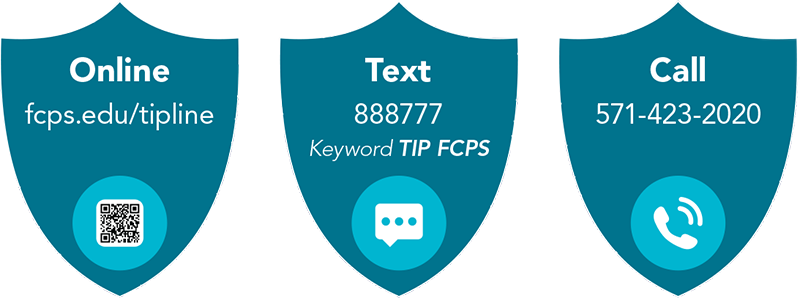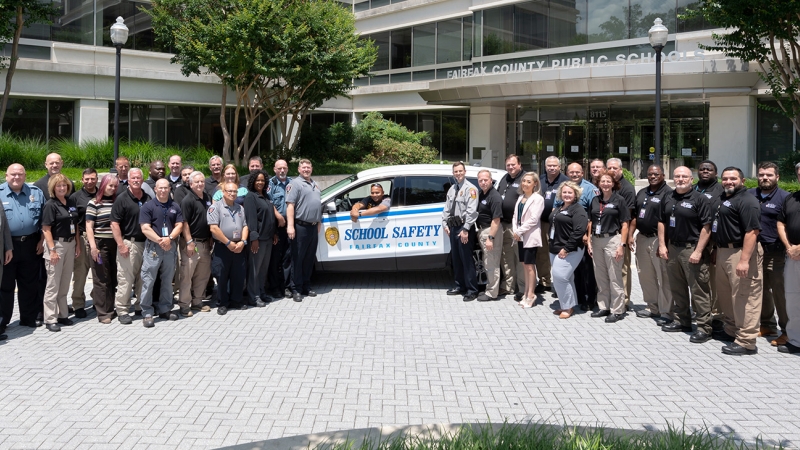
School Safety & Risk Assessment
Parents and Students: Help make our schools safer by learning about risk prevention, the risk assessment process, and the FCPS anonymous Tip Line.
This webpage is being translated through "machine translation" using Google Translate. [Disclaimer Statement]
Risk Prevention
Fairfax County Public Schools has a well-established policy and evidence-based protocol for responding to threats of violence in our schools. In 2019, FCPS received a U.S. Department of Justice STOP (Students, Teachers, and Officers Preventing) School Violence grant focused on improving school safety and security by providing students, teachers, and school resource officers with the tools they need to recognize, respond quickly to, and help prevent acts of violence. Through this grant, FCPS revised its threat assessment protocols to reflect best practices from emerging research and science, with the goal of better understanding risk factors for violence as a basis for prevention. Key findings from this body of research consistently affirm that targeted school violence is preventable if we focus on recognizing early warning signs and intervening promptly.
Addressing concerning behaviors or threats of violence in FCPS schools
When a student makes an explicit or implicit threat or demonstrates concerning behaviors that may pose a danger to the safety of school staff or students, a school team conducts a risk assessment. The team includes a school administrator, school counselor, school psychologist, school social worker, teacher, school resource officer, and other staff members as needed. Risk assessment procedures are followed regardless of disciplinary action. These procedures are aligned with and informed by the Code of Virginia, section 22.1-79.4, which outlines the specific steps that must be taken by educators when a student poses a safety risk to themselves or others.
What is a Risk Assessment?
A “risk assessment” is a process for identifying students who present concerning behaviors that could result in harmful, dangerous, or violent situations; assessing these behaviors; and managing and mitigating potential safety risks to all individuals involved. Risk assessments are conducted when students express an intent to harm themselves and/or others. All school staff are trained to recognize and report concerning behaviors and explicit or implicit threats. The goal of conducting a risk assessment is to provide assistance to the student being assessed, to support victims or potential victims, and to take appropriate preventive or corrective measures to maintain a safe and secure school environment.
Risk Assessments are Required
Virginia legislation (§ 22.1-79.4) states, “Each local school board shall adopt policies for the establishment of threat assessment teams, including the assessment of and intervention with individuals whose behavior may pose a threat to the safety of school staff or students.” It further stipulates, “Each division superintendent shall establish, of each school, a threat assessment team that shall include persons with expertise in counseling, instruction, school administration, and law enforcement.”
The Code of Virginia also requires that, “Upon a preliminary determination that a student poses a threat of violence or physical harm to self or others, a threat assessment team shall immediately report its determination to the division superintendent or his designee. The division superintendent or his designee shall immediately attempt to notify the student's parent or legal guardian. Nothing in this subsection shall preclude school division personnel from acting immediately to address an imminent threat.”
The Risk Assessment Process
If it is determined that a risk assessment is needed, the school administrator shall interview the student who communicated a threat or demonstrated concerning behaviors, the potential target(s) of the harm, and any witnesses as expeditiously as possible to obtain specific information regarding the concerning behaviors. Additional background information is also reviewed to support the assessment, including a review of the student’s relevant academic records. Based on the information gathered through interviews and a review of records, the risk assessment team determines the level of risk. Supportive interventions are then identified and provided to the student of concern and any intended targets.
Threats of self-harm are also investigated via the risk assessment process and require
compliance with the Code of Virginia, section 22.1-272.1, which outlines the specific steps that must be taken by educators when a student expresses or is suspected of experiencing or exhibiting suicidal thoughts or behaviors. In these circumstances, the FCPS guidelines for risk assessment shall be followed to determine whether the student poses an imminent risk for suicide, notify caregivers, and provide recommendations for mental health intervention.
Discipline and Risk Assessments
A risk assessment is not a disciplinary action and is not a prerequisite to disciplinary action. Whereas discipline is concerned with responses to behavior that has already occurred, risk assessment is concerned with preventing future harm. Follow-up interventions and case management are provided as a result of a risk assessment, whereas administrative consequences are provided as a result of an SR&R violation. However, disciplinary action and referral to law enforcement may occur in conjunction with a risk assessment as required by the current version of Regulation 2601, Student Rights and Responsibilities Booklet.
Caregiver Involvement
- If a risk assessment is conducted with your child, you will be notified by a member of the school team. Collaboration between the school and family is essential in ensuring student safety.
- Threat to Self
If your child is deemed to be at imminent risk for suicide, you will be contacted immediately. A member of the school-based mental health team (school counselor, psychologist, or social worker) will request that you pick up your child from school and will supervise your child until you arrive. Upon your arrival, they will provide you with emergency referral resources. The school team will follow up with you and your child the next school day to discuss any additional support your child may need.
If your child is not at imminent risk for suicide, you will still be notified by a member of the school-based mental health team that a risk assessment was conducted. The school team will provide you with community referral options for your child, and discuss potential school-based interventions as well to support identified needs. - Threat to Others
If your child has made a threat to harm someone else and the school team has determined that there is moderate or imminent risk of harm, you will be contacted immediately. School administrators and school-based mental health professionals will maintain supervision of your child. They will provide you with appropriate referrals for your child to see a licensed or certified mental health professional at your expense. The team will follow up with you and/or your child to discuss additional school-based interventions.
Help Prevent School Violence
- Caregivers and community members play an important role in promoting safe schools by following school sign-in, drop off, and other safety procedures at the school and reporting concerns to the police, the Anonymous Tip Line, and/or school administration. Caregivers can also talk with their children about reporting concerns to a trusted adult.
- For more helpful tips on what to say to children about school violence prevention, please view the School Violence Prevention: Tips for Parents & Educators (from the National Association of School Psychologists).
- Caregivers and community members can learn more about reducing school violence by recognizing concerning behaviors and fostering open communication with youth by taking the Kognito Safe and Caring Schools for Parents and Caregivers training.
To access this free training module:- Go to the Kognito website
- Select your child’s school
- Follow the step-by-step instructions to create an account
FCPS Tipline
As part of Fairfax County Public Schools' continuing efforts to maintain safe schools, a confidential and anonymous Tip Line is available to students, parents, staff, and other members of the FCPS community.
- Online: www.fcps.edu/tipline
- Text: 888777 Keyword TIP FCPS
- Call: 571-423-2020

Contact
Please contact your child’s school administrator with questions about FCPS' risk assessment policy or how to report a threat or concern.
Related Pages

Safety and Security
Exhaustive measures are taken to make FCPS a safe and secure place to learn and work.

School Psychology Services
Learn how our school psychologists help students, families, and schools. Our psychologist school assignments are listed here.

School Social Work Services
School social workers are mental health professionals who address the social, emotional, behavioral, and environmental factors impacting a student’s ability to perform at their best. Our social worker assignments are listed here.